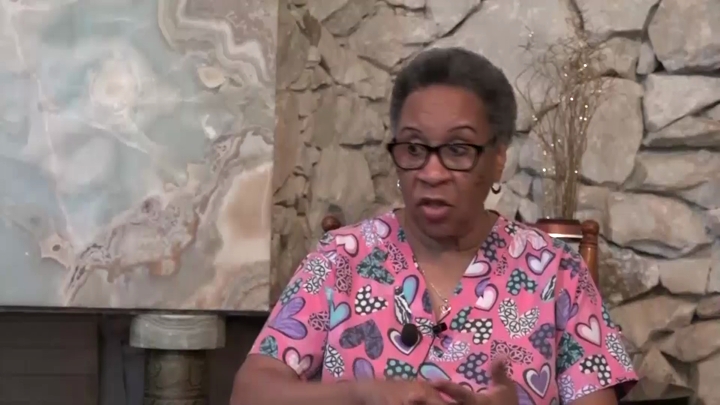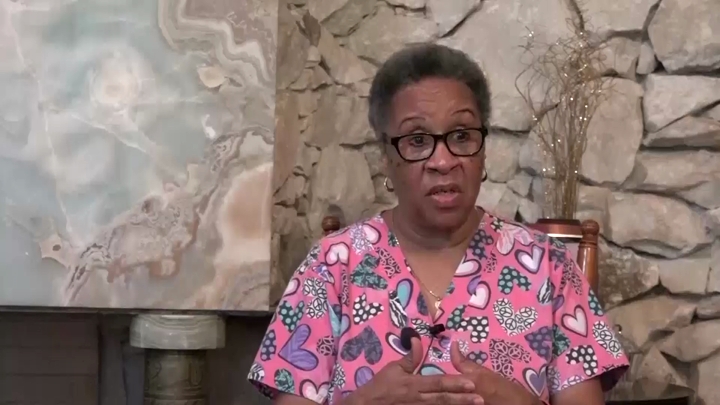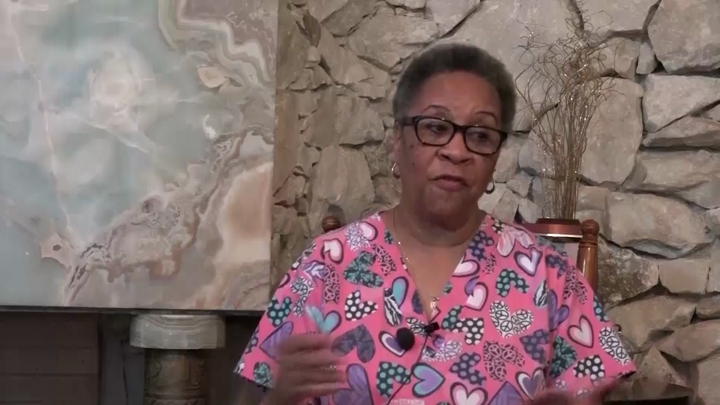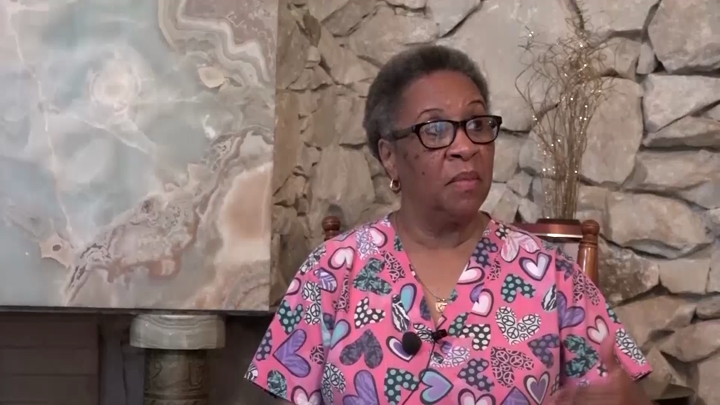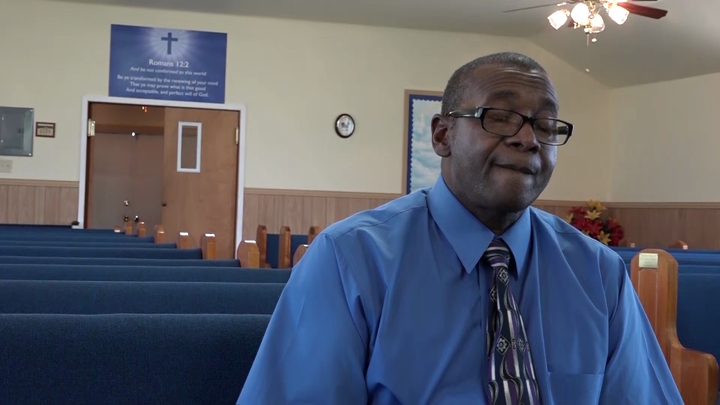Abdullah / Protests and Marches, Part One
sign up or sign in to add/edit transcript
Helena Abdullah: A white political science professor, this other professor lived just over across from TJR. I can’t think of his name. We would meet and strategize at his home. We had a lot of whites marching with us too because as we went through downtown we would pick up Caucasians. The first march went all the way downtown, we hit North Street and came up North Street from, I think, Houston Street or somewhere there. Came all the way up North Street and ended up at SFA. That was the first one. The second one we started down off of Haywood Street and then we went up there. The third one, you see these were over the period of several months, so by the time the third one started this town was pretty hot. Interviewer: What month was the first one would you say? Helena Abdullah: The first one was the springtime because it was nice and breezy and cool, and it was pleasant. Interviewer: Spring of 1969? Helena Abdullah: Spring of 1969. The second one had to been the end of school 1969, the end of the semester. The last one was in the summertime for sure. Interviewer: With the Association, did y’all ever think of demands? Helena Abdullah: We did, and we went to Dr. Stein, but nothing ever came of it. Promises of let me look into this. Interviewer: What were some of your demands did you think? Helena Abdullah: We wanted a place to meet. We wanted better things for the students on the campus, better treatment of the students on the campus in the classrooms. They used our athletes because when I was up there James Silas was up there, big, tall George Johnson was up there, Harvey Rasen was up there. Harvey Rasen was, what do they call them, the guys that get these prizes for football? Interviewer: All-American or Heisman? Helena Abdullah: Heisman. Harvey Rasen was a Heisman trophy winner from SFA. James Silas. Oh my gosh, I’m drawing a blank. Now that’s 1966, but George Johnson, there was a lot of athletes that were putting SFA on the map, but we weren’t getting any benefits of them using our guys. So, we wanted some equal treatment. Interviewer: Did y’all have any demands about black faculty? Helena Abdullah: I don’t remember. Interviewer: Did you have any black faculty at the time? Helena Abdullah: We had one counselor and here name was Edwina Aikens. She was the only black counselor up there. We didn’t even have a multicultural center up there that I can remember. I don’t remember any other blacks unless it was a coach maybe. Interviewer: Did y’all have any demands associated with the curriculum? Helena Abdullah: Not that I recall. We wanted equal treatment more than anything else. Tim was from Houston and he had the list. Back when you’re doing those kind of things, you don’t think that’s important to remember. I certainly wish I could remember a lot of the things. We talked. It was him, myself, a lady named Beverly, she’s a lawyer now, there were four of us that went in to see him and I think during the time we went in there Dr. Stein knew that I had been marching and I don't think he wanted me in his office. Guess who didn’t care. He would address everything to Tim and the other young lady. He would kind of look at me and say a few things, but he tried to avert his attention from me because I was needling him in the eye. I was boring a hole in him because I wanted him to look at me. I wish I could remember the demands and I don’t remember them, you know, not everything. I know equal treatment. Give us some place to meet. Treat us like you treat everybody else. We’re paying the same tuition. Our fees are the same. We’re not discounted in any way. Why can’t we have the same? Interviewer: Would they not allow you to reserve a room? Helena Abdullah: There was no such thing as reserving a room for us. We had to meet where we could. We could meet in those classrooms but when the cleaning crew came through we had to leave because they’d lock the rooms up. Interviewer: Y’all started doing demonstrations in the spring. What kind of work did y’all do in the fall before that? Helena Abdullah: You know, I don’t really remember because if I’m not mistaken my mother and my family was getting on me about all this up front and in your face type stuff that I was doing. Of course, at the time, I didn’t care. I didn’t think I was immortal. I didn’t think I was big and bad. I just was not afraid to be out front because there were so many people who were, and I wasn’t one of them. It just didn’t occur to me to not speak out for people who couldn’t speak out for themselves. It just didn’t occur to me not to do it. Getting onto the fall, I think that was when Mickey McGuire had been arrested and I think that kind of stopped a lot of things because he was helping the momentum. They had started doing some things in town here as far as making some changes. We were written up in the newspaper up here finally. I had made mention in an article, because I had been interviewed by the Houston Chronicle, I made mention in a meeting with some of the people downtown. It was me, Paul Jackson, Mickey McGuire may have been there. I know Dr. Stevens was there. There was about six of us there at the meeting with the town. Interviewer: You had gotten attention before the marches? Helena Abdullah: This is during the marches is when, because the people from the Houston Chronicle and the paper from Austin were calling to get our perspective on what was going on.
| Interview | Interview with Helena Abdullah |
| Subjects | Community Organizations › Civil Rights Organizations › National Association for the Advancement of Colored People (NAACP) |
| Media | |
| Direct Action | |
| Direct Action › Marches | |
| Direct Action › Petitions | |
| Student Activism | |
| Student Activism › Student Organizations | |
| Direct Action › Protests | |
| Tags | Houston Chronicle, Houston, TX |
| Jackson, Paul | |
| Johnson, George | |
| McGuire, Mickey | |
| Rasen, Harvey | |
| Stephen F. Austin State University | |
| sign up or sign in to add/edit tags | |
| Interview date | 2016-06-30 |
| Interview source | CRBB Summer 2016 |
| Interviewees | Abdullah, Helena |
| Interviewers | Howard, Jasmin |
| Locations | Houston, TX |
| Nacogdoches, TX | |
| Duration | 00:06:16 |
| Citation | "Protests and Marches, Part One," from Helena Abdullah oral history interview with Jasmin Howard, June 30, 2016, Nacogdoches, TX, Civil Rights in Black and Brown Interview Database, https://crbb.tcu.edu/clips/2416/protests-and-marches-part-one, accessed February 24, 2026 |


